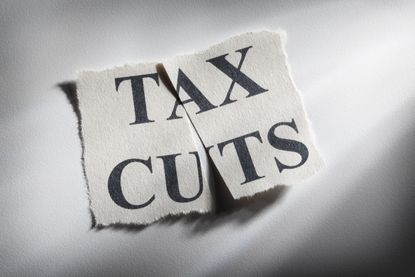National Insurance increase to be reversed in November. What does it mean for your pay?
Chancellor announces cuts to National Insurance, which could save workers an average of £135 this tax year, and £330 in 2023/24


A 1.25 percentage point rise in National Insurance that was introduced in April will be reversed on 6 November, the government has announced.
It will also axe the Health and Social Care Levy, a separate tax to fund health and social care that was coming into force in April 2023.
The temporary rise to National Insurance and subsequent introduction of the levy were unveiled by former chancellor Rishi Sunak, but Liz Truss pledged to change it during the Conservative leadership race.
The Treasury said almost 28 million people would keep an extra £135 of their money on average in 2022/23, and an extra £330 on average in 2023/24, thanks to the change. Broadly, the higher your salary the more you’ll benefit; for example someone earning £100,000 would save £91 a month (or £1,092 annually), compared to a worker earning £27,000 who would only save £15 a month (£180 a year).
Meanwhile, 920,000 businesses are set to save almost £10,000 on average next year.
Chancellor Kwasi Kwarteng made the announcement ahead of tomorrow’s so-called mini-Budget. He said: “Taxing our way to prosperity has never worked. To raise living standards for all, we need to be unapologetic about growing our economy.
“Cutting tax is crucial to this – and whether businesses reinvest freed-up cash into new machinery, lower prices on shop floors or increased staff wages, the reversal of the levy will help them grow, whilst also allowing the British public to keep more of what they earn.”
Look After My Bills Newsletter
Get the best money-saving tips, tricks and deals sent straight to your inbox every week. Make sense of your money in partnership with The Money Edit.
The Health and Social Care Levy was expected to raise around £13bn a year to support the NHS.
Kwarteng said that despite reversing the tax rise, funding for health and social care services would be protected and would remain at the same level as if the levy were in place, protecting the NHS through the winter and ensuring long-term investment in social care.
How much National Insurance will I pay?
National Insurance is paid by employers, employees and the self-employed, meaning the tax cuts will benefit both companies and workers.
Sunak previously increased the National Insurance thresholds in July 2022, lifting 2.2 million of the lowest earners out of paying the tax.
New chancellor Kwarteng says he will retain these higher thresholds.
Reversing the 1.25 percentage point rise in National Insurance means most employees will receive a cut to their NI via payroll in their November pay. Some may receive it in December or January though, depending on their employer’s payroll software.
If you don’t receive the tax cut, you should contact your employer for a refund. If the employer says it cannot issue a refund, or the employer is no longer trading, employees should apply to HMRC for a refund.
How much will I save from the cut to National Insurance?
Basic-rate taxpayers will on average see a gain of approximately £75 in 2022/23, rising to £175 in 2023/24, according to the Treasury.
For higher-rate taxpayers, these figures are on average £300 in 2022/23, rising to £700 in 2023/24.
For additional-rate taxpayers, the gain is much higher: around £1,650 in 2022/23, and £3,890 in 2023/24.
Shaun Moore, tax and financial planning expert at the wealth manager Quilter, commented: “The 1.25% reduction means that someone earning £50,000 a year would see an extra £40 in their pocket each month, equating to £467 extra annually. Whereas the average graduate earning £27,000 would see a miserly £15 extra a month or £180 a year.
“Reversing the NI hike has a much greater impact on someone earning £100,000, who would save £91 monthly or £1,092 annually.”
| Annual salary | 20,000 | 30,000 | 40,000 | 50,000 | 80,000 | 100,000 |
|---|---|---|---|---|---|---|
| Current NI | 984 | 2,309 | 3,634 | 4,959 | 5,961 | 6,611 |
| After NI reduction | 892 | 2,092 | 3,292 | 4,492 | 5,119 | 5,519 |
| Tax saving (£) | 93 | 218 | 343 | 468 | 843 | 1,093 |
Source: interactive investor
What does this mean for the self-employed?
Self-employed people and company directors will benefit from the tax cut. According to the Treasury, they will pay a blended rate of National Insurance – taking into account the changes in rates throughout the year – when they submit their self-assessment tax return.
Will pensioners benefit from the tax changes?
Unlike National Insurance, the Health and Social Care Levy was due to have been paid by people over the state pension age who were still working.
Scrapping the levy means pensioners will not now have to pay 1.25% of relevant earnings from April 2023.
Any other tax rates changing?
As part of the cancellation of the Levy, the chancellor is also set to confirm in his mini-Budget that the 1.25 percentage point increase to income tax on dividends will be scrapped from April 2023.
The increased dividend tax was introduced in April 2022 to ensure those who gained income from dividends contributed the same amount to help fund health and social care.
According to the Treasury, those who pay tax on dividends will save an average of £345 next year.
Ruth Emery is contributing editor at The Money Edit. Ruth is passionate about helping people feel more confident about their finances. She was previously editor of Times Money Mentor, and prior to that was deputy Money editor at The Sunday Times. A multi-award winning journalist, Ruth started her career on a pensions magazine at the FT Group, and has also worked at Money Observer and Money Advice Service. Outside of work, she is a mum to two young children, a magistrate and an NHS volunteer.
-
 Three energy firms pay £8m in switching compensation - has your provider paid out?
Three energy firms pay £8m in switching compensation - has your provider paid out?More than 100,000 customers have received compensation after changing providers, but is now a good time to switch energy suppliers?
By Tom Higgins Published
-
 Save £300 on your supermarket shop with cashback accounts
Save £300 on your supermarket shop with cashback accountsBanks, credit card companies and cashback sites are all offering cashback on your supermarket shop, but can you use them all to max out your savings?
By Vaishali Varu Published
-
 Save on petrol: how to save 5p off a litre of fuel at Morrisons
Save on petrol: how to save 5p off a litre of fuel at MorrisonsPetrol prices may have been falling since last summer but every penny counts at the pump. Here’s how to save 5p a litre at Morrisons for a limited time
By Sue Hayward Published
-
 Morrisons relaunches discount scheme with cheaper prices for loyal shoppers
Morrisons relaunches discount scheme with cheaper prices for loyal shoppersMorrisons is the latest supermarket to revamp prices and offers for its loyalty scheme members
By John Fitzsimons Published
-
 Coronation freebies and discounts: what’s up for grabs
Coronation freebies and discounts: what’s up for grabsFrom free railcards and holiday giveaways to discounts off food, we highlight the special offers launched to mark the coronation of King Charles III
By Ruth Emery Last updated
-
 8 ways to get interest-free money if you’re struggling
8 ways to get interest-free money if you’re strugglingHere are 8 clever ways to get interest-free income if you’re struggling with the rising cost of living
By Vaishali Varu Last updated
-
 Best birthday freebies and discounts
Best birthday freebies and discountsEnjoy your special day with these birthday discounts and freebies - we highlight 22 of the best offers
By Vaishali Varu Published
-
 Festival ticket scam warnings – how to protect yourself
Festival ticket scam warnings – how to protect yourselfConcert ticket scams have rocketed by more than 500% over the past year, while festival fraud has more than doubled. Here’s how to keep yourself safe ahead of the festival season.
By Tom Higgins Published
-
 Co-op Member Prices: Supermarket unveils discount scheme for loyal shoppers
Co-op Member Prices: Supermarket unveils discount scheme for loyal shoppersNew Co-op scheme means reduced prices for shoppers who join the co-operative. How much does it cost to join, and how does it compare to similar schemes run by Sainsbury’s and Tesco?
By John Fitzsimons Published
-
 Emergency alert test: what to expect and how to avoid being scammed
Emergency alert test: what to expect and how to avoid being scammedWe tell you everything you need to know about the UK’s first emergency alert test, which takes place this Sunday
By Vaishali Varu Published